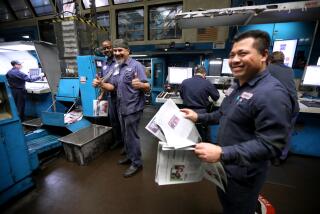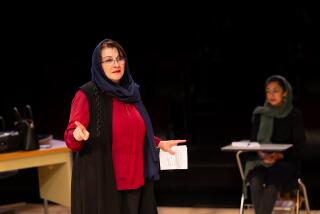Opinion: Could the print edition of the OED be dead (syn: defunct, lifeless, expired)?
Is it R.I.P. for the OED, paper version?
The fountainhead for all things about English could come to exist, like Johnny Depp in “Transcendence,” only in an online incarnation.
The English language has somewhere between 800,000 and 1 million words, and the Oxford English Dictionary is dedicated to bringing you the lineage and usage of every one of them.
The third edition is in the works, but that’s not headline news — it has been in development for at least 20 years. When it does appear, it could run to 40 volumes, twice as long as the second edition from only 35 years ago. And that could spell the last of anything but a virtual OED. There’s “too big to fail” and, maybe, “too big to print.”
The speed at which the language metastasizes has always made it hard for dictionaries to keep up. (Just take a gander at “Ball of Fire,” one of my favorite movies: Barbara Stanwyck plays a nightclub chanteuse, Gary Cooper a slang-deprived lexicographer.)
The first OED was published, in parts, starting in 1884, and it wasn’t done until 1928, by which time there were also many more words than there had been more than 40 years before.
That’s one of the glories of English: This immigrant country of ours takes immigrant words as its own and crafts new ones all the time to meet new realities of our lives. Five years ago, “selfie” would have been regarded as a badly misspelled “selfish.”
Why mourn paper, then, when a perfectly good virtual edition will be cheaper and faster and won’t require you to haul out a magnifying glass to read the entries?
A couple of reasons. You don’t have to be a logophile to know the pleasure of the chance encounter. Say you open up the OED because you’re curious about “palliative,” but on your way there, leafing through those filo-thin pages, your eye alights on “pall-mall” (not the cigarettes) and “pellucid” and “palimpsest.” All nifty words that you never would have had the pleasure of finding if you’d just typed “palliative” into some search engine.
And aren’t chance encounters the ones that yield the most gratifying results, just because we didn’t plan them? A dictionary like the OED is the Six Degrees of Kevin Bacon for words.
And the other reason to keep a paper OED?
The sun. Solar flares can mess up the satellites we depend on for electronic communication, and a really big solar event like a coronal mass ejection, which can even screw up compasses, could play havoc with electrical systems on Earth and wipe “the cloud” from the virtual sky.
Yet decent quality paper and print lasts for hundreds of years and is still legible. Can we say that about a cassette tape? Or Blu-ray? Absent a match and Ray Bradbury’s 451-degree temperature, paper and the words on it can survive a lot. Even if it’s wet, paper can be freeze-dried and salvaged, as the aftermath of the 1986 library fire in downtown L.A. demonstrated.
By all means, give us an OED app, and a Web version, affordable and accessible. But we need paper. Posterity needs paper. And if it costs a lot, go hit up one of those guys who made a pile from spreading virtual words and get him to invest a little in the paper kind. After all, as the OED’s chief editor, Michael Proffitt, explained, it’s the digital revolution’s fault that the new edition is coming along so slowly: it’s “information overload.”
ALSO:
Smoke weed, turn into a pothead? Not so fast.
Hillary Clinton as grandmother-to-be: Of course she’ll be working it
USC student protest: Did the school really have to call their parents?
Follow Patt Morrison on Twitter @pattmlatimes
More to Read
A cure for the common opinion
Get thought-provoking perspectives with our weekly newsletter.
You may occasionally receive promotional content from the Los Angeles Times.







